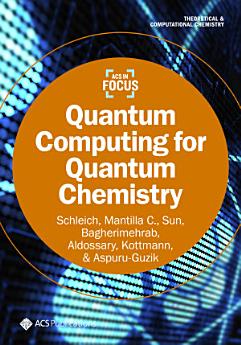Quantum Computing for Quantum Chemistry
Об электронной книге
Quantum Computing for Quantum Chemistry focuses solely on quantum chemistry as an application, as it is the subfield with the most concrete potential for quantum computing. If this work is your first exposure to quantum chemistry and quantum computing, focus on chapters one and two. Both quantum chemistry and quantum computing by themselves are rather technically involved disciplines. The reader should have had an introductory course on quantum mechanics and linear algebra and some exposure to computational chemistry and quantum chemistry.
The primary audience for this work is graduate students familiar with quantum computing but not quantum chemistry or those familiar with quantum chemistry but not quantum computing. The authors provide pointers to useful textbooks throughout the work for those who need background on the material.
Об авторе
Philipp Schleich is currently a Ph.D. student in Computer Science at the University of Toronto. He is interested in using quantum computers to simulate problems from the physical sciences, with a focus on applications in quantum chemistry and differential equations. Before his Ph.D., he completed a M.Sc. in Simulation Sciences at RWTH Aachen University and a B.Eng. in Mechanical Engineering at the Technische Hochschule Nürnberg.
Luis Mantilla Calderón is a Ph.D. student in Computer Science at the University of Toronto. In 2021, he completed a double major in Physics and Mathematics at Universidad de Los Andes, Bogotá. In 2023, he received his M.Sc. in Physics from the University of British Columbia. Currently, Luis works in the intersection of quantum computing and machine learning algorithms and applications thereof.
Chong Sun is an assistant professor at Rutgers Chemistry, joining in Fall 2025. Her research integrates quantum chemistry, artificial intelligence (AI), and quantum information to advance materials simulations and discovery. She earned her Ph.D. from the California Institute of Technology and her B.Sc. from Peking University. Outside of research, she enjoys hiking, bouldering, and reading.
Mohsen Bagherimehrab is currently a staff research associate at the University of Toronto, working with Alan Aspuru-Guzik’s group in the Department of Chemistry and Computer Science. Before that, he was a postdoctoral fellow in the same group. Mohsen earned his Ph.D. in Physics from the University of Calgary in 2022. His research centers around the theory of quantum information processing, especially quantum algorithms for scientific computation, with emphasis on practical applications.
Abdulrahman Aldossary (AA) is a postdoctoral fellow at the University of Toronto working on the intersection of quantum chemistry with advanced computing techniques like quantum computing and machine learning. He obtained his Ph.D. in Chemistry from the University of California, Berkeley, working on developing quantum chemistry methods. AA was awarded with the prestigious KAUST Ibn Rushd postdoctoral fellowship in recognition of his achievements.
Jakob S. Kottmann is a professor in the Department of Computer Science at the University of Augsburg. His group is investigating quantum algorithmics with a focus point on scientific software and holistic approaches to quantum chemistry. He is the lead developer of the tequila package that implements an abstraction framework for variational quantum algorithms.
Alán Aspuru-Guzik is a professor at the University of Toronto, appointed primarily in the Departments of Chemistry and Computer Science (51/49) and cross-appointed to the departments of Chemical Engineering and Applied Chemistry, the Department of Materials Science and Engineering, as well as the Institute of Medical Science. He is a CIFAR AI Chair at the Vector Institute for Artificial Intelligence and a CIFAR Chair co-directing the CIFAR Accelerated Decarbonization Program, as well as director of the Acceleration Consortium, a large initiative led by the University of Toronto for the development of self-driving laboratories, which combine AI, automation, and domain sciences to accelerate materials development. Alán’s research interests lie at the intersection of computer science and chemistry, in particular development of novel methods and applications in AI for materials, as well as robotics and automation of chemical experiments. He is particularly interested in applications of functional organic materials, such as organic solid-state lasers, organic light-emitting diodes, and organic flow batteries, amongst others. He further serves as Editor-in-Chief of the Royal Society of Chemistry journal Digital Discovery and is cofounder of Zapata AI, Kebotix, Intrepid Labs and Axiomatic AI.




